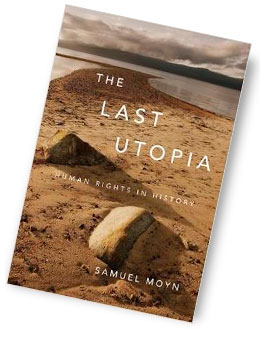— Human Rights in History
Author: Samuel Moyn
Publisher: The Belknap Press of Harvard University Press (Cambridge, Massachusetts, and London, England 2010)
Reviewed by Sarah Poon
The expression “human rights” conjures the highest moral values and political ideals to most people. What constitutes the content and the scope, however, becomes problematic, controversial and difficult to articulate, save some basic precepts or norms.
Samuel Moyn, a professor of History at Columbia University (New York), in the prologue, maintains that “The phrase implies an agenda for improving the world and bringing about a new one … It is a recognizable utopian program … that has not yet been called into being. This utopianism ‘evoke[s] hope and provoke[s] action’.”
The book traces the complex and contested history of human rights origins and argues that its rise to prominence in the 1970s is very recent and its approach as a modern commitment to the “cause of justice” is very novel, in each case, among utopian visions. Human rights offers a moral universalism drawing upon the authority of international law and using the machinery of alliance with, and sanction against, the nation-states, the principal constituents in international law and of international institutions.
Moyn’s thesis dismisses the conventional source attributions to Greek philosophy and monotheistic religion; European natural law; American and French republican revolutions; the American anti-slavery civil war; and the horror of the Holocaust. He credits the transformative impact of events and contemporaneous forces in the late 1960s and 70s. These involve the collapse of the legitimacy of earlier competing political utopias: revolutionary communism, anti-colonial nationalism and Christian socialism; the moral shift of the West towards a universalism of human rights; and the ideological loosening of the legalistic claim of nation-states to absolute sovereignty, previously, the foundational principle and framework of international law for centuries.’
In Moyn’s view, the founding of the United Nations and the proclamation of the Universal Declaration of Human Rights in the 1940s did not profoundly modify the agendas of the Western powers or establish a truly internationalised human rights regime. Human rights talk, if any existed, was dependent on the political and economic agendas of individual states and was, generally, pushed to the periphery in the Cold War partisanship by which international relations were conducted.
In the 1950s and 60s, human rights became deeply entwined in, but justifiably distrusted by, the anti-colonial independence struggles and postcolonial confrontations against the reimposition of imperialism in the Middle-East, South-East Asia and Pan-Africa. Prioritised on global idealism, agendas were concerned with collective self-determination and economic decolonisation; constitutional nation building; and the political and social realities in post-war Europe rather than the universalism of international protection of individual human rights as envisaged and advocated in the 1970s.
Moyn highlights this reshaped historical breakthrough and its catapulted trajectory and largely attributes it to the American President, Jimmy Carter’s adoption of the language of human rights in his inaugural speech on January 20, 1977 that “[America’s] commitment to human rights must be absolute” and his exaltation of “a new world spirit and a craving for basic human rights” as his foreign policy tenor.
The Nobel Peace Prize awarded to Amnesty International (AI) on December 10, 1977 for its human rights work and the Helsinki processes and accords, further underscored the recently arrived worldwide ascendency of human rights.
The historical surge coincided with and paralleled the rapid progress of social movements for change. Social activism became internationalised and non-governmental organisations grew exponentially. Much of their advocacy was reworked to bypass the established institutional avenues, national and international, and implemented novel strategies of concrete grassroots measures or specific, more manageable moral acts, as exemplified by the strategies of Amnesty.
Never before could human rights, as a moral slogan, an idealised worldview or a critical paradigm, unify so many diverse causes and activisms. As Moyn contends, such a massive and popular appeal could occur only on the deterioration of other contending utopian visions and the integrity bankruptcy of the Cold War rivalry in the international moral landscape.
The accelerating dissidence movements in Eastern Europe, the Soviet Union and Latin America provided a robust backdrop against which, by the 1970s, individual dissidents and dissident groups incorporated concessions to human rights into their approaches or went further and disavowed the traditional means in political struggles and transformed their schemes into human rights agendas. Such a transformation, Moyn claims, greatly depended on a decline in elite sympathies, both domestic and abroad, for once euphoric anti-colonial nationalism or romanticised liberation within and by the authoritarian states, whether of leftist or rightist ideologies.
Arguably, the proposition that “international law has been reconceived and it is the law of human rights” could be the prime beneficiary of the ideological crisis and the remaking of utopian aspirations in the 20th century. The trajectory has been such that, in the last three decades, human rights thinking, as a morality of individual rights and a desirable ideology and mechanism for social change and legal reform, has come to claim a possible pre-eminence within state borders and beyond.
Nevertheless, Moyn’s enthusiasm falls below complete endorsement of the trends that he observes and documents.
Moyn does not accept that this last utopia is a moral one and he argues that human rights should restrict itself to laying down minimal constraints on responsible politics operating through other frameworks of ideas. He also notes that the world and the historical conditions into which human rights thinking emerged, no longer, persist and that today’s conditions are radically different.
Perhaps, the uncertain prospect of human rights to shape the utopianism of the future is due, paradoxically, to the creation of a new burst of ideas which, itself, has emerged from human rights thinking, namely, a new politics of humanity.
Sarah Poon



